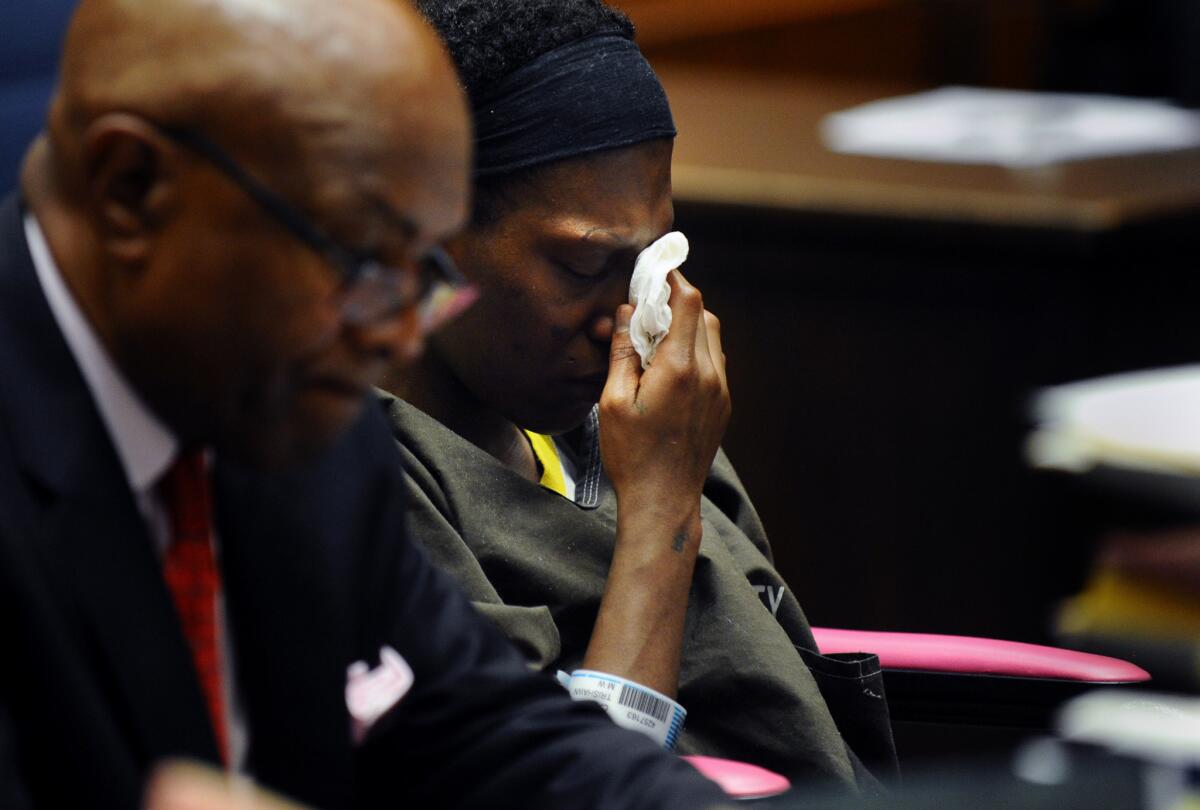Homeless woman charged with assault after fatal LAPD shooting will avoid jail time

Trishawn Cardessa Carey, who was accused of assault for allegedly grabbing and lifting an officer’s baton during a scuffle last year on skid row, will avoid jail time.
- Share via
A last-minute plea deal will spare a mentally ill homeless woman from jail time after she was charged with assault for allegedly hoisting an officer’s baton during a fatal police shooting on skid row.
On Monday, prosecutors agreed to reduce Trishawn Cardessa Carey’s felony resisting-arrest charge to a misdemeanor and to drop the more serious charge — assault with a deadly weapon against a police officer — if she agreed to three years’ probation.
Carey, 35, who has schizophrenia, whispered after accepting the plea.
“Thank you,” she said. “Thank you, thank you.”
As part of the deal, Carey was also ordered into a residential treatment program.
Carey’s case has largely been overshadowed by the killing of Charly Keunang, a Cameroonian immigrant who was shot by Los Angeles police on March 1, 2015. Keunang was shot as officers attempted to take him into custody on suspicion of robbery.
The case drew worldwide attention after someone posted a recording of the shooting on Facebook.
In the video, Carey, who was standing nearby, picks up a police baton, which fell to the ground during the scuffle with Keunang, and raises it into the air. Her actions, prosecutors said at the time, constituted assault.
The case served as a test of sorts for Dist. Atty. Jackie Lacey, who has pushed for an overhaul in the way the criminal justice system treats people with mental illness. She has made few, if any, concrete changes in the way her office deals with prosecuting such cases.
Carey’s attorney, Milton Grimes, said his client has wanted to get treatment for a long time. This case, he said, highlights the gap in services available to the mentally ill.
“It’s just sad,” he said. “It’s sad we have to go through the criminal justice system to get treatment.”
Under California’s three-strikes sentencing law for repeat offenders, Carey — if she’d been convicted of the assault with a deadly weapon on an officer charge — would have faced up to 25 years to life in prison.
In a court filing, Grimes said her previous strike cases were directly tied to her mental illness. His report described the crimes as a 2002 robbery in which she punched the victim in the head and a 2006 assault with a deadly weapon — a ceramic figurine — against a shopkeeper who asked her to leave his store.
A spokeswoman for the district attorney’s office said prosecutors asked a judge to dismiss the strike allegations last week “in the interest of justice.”
The case against Carey drew protests from homeless and mental health advocates who said the district attorney’s office was overzealous in its prosecution. Carey, they argued, needed treatment, not punishment.
“Jail was not the solution for Trishawn,” said Suzette Shaw, a member of Los Angeles Community Action Network’s Downtown Women’s Action Coalition. “This is the best thing — she would have been another person lost.”
Shaw said she viewed Carey’s prosecution as an over-the-top move that “hardened my heart” but said she was overjoyed Monday.
“It makes you feel like, maybe, there is justice,” she said, crediting the district attorney’s office for agreeing to drop one charge and reduce the other to a misdemeanor.
Grimes said his view is more jaded and, given the facts, it should not have taken prosecutors so long to drop the felony charges. In an earlier plea proposal, prosecutors offered to have Carey live in a mental health facility for a year if she pleaded guilty to a felony count of resisting an officer, with the understanding that they’d reduce it to a misdemeanor if she completed treatment.
The upfront misdemeanor offer Monday came as jurors gathered for her trial.
“I had to fight them up until the eve of trial to get this misdemeanor,” Grimes said. “We talked and talked and talked and I said, ‘This is not felonious.’”
Asked why the district attorney’s office ultimately opted for the misdemeanor offer, a spokeswoman said, “We do not comment on plea negotiations.” The office also declined to comment on defense and activists’ claims that the prosecution was overzealous.
During Monday’s hearing, Deputy Dist. Atty. Gregory Denton requested that Carey not be released to the residential program at a facility called A New Way of Life, because she was previously housed there and left before finishing treatment.
Los Angeles County Superior Court Judge Drew E. Edwards ultimately approved her release to the program, noting that she’d already served more than a year behind bars on a charge now reduced to a misdemeanor. He urged Carey to appear for her sentencing April 20. If she misses the date, the judge warned, he could decide to give her jail time.
“Ma’am,” Edwards said, “we’re all hoping you ... get the treatment we all know you need.”
Twitter: @marisagerber
ALSO
Man faces charges of giving cash and beer to O.C. jail escapees
‘Extensive’ hate graffiti found on high school campus in Pacific Palisades
Developer should lose building permits over illegally chopped trees, L.A. officials say
More to Read
Sign up for Essential California
The most important California stories and recommendations in your inbox every morning.
You may occasionally receive promotional content from the Los Angeles Times.











